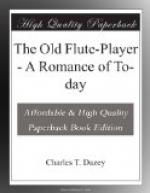“Yes,” she said to him, with real regret, “I certainly must see your daughter; but I am glad first to explain to you—”
“The pleasure,” said the courtly flute-player, “is mutual, Madame. May I ask you what you must explain?”
Mrs. Vanderlyn now summoned to her face a look of sympathy, lugubrious and as sincere as she could make it. “It will be a blow, Herr Kreutzer.”
The old man was uneasy, but he hid it as best he could, under a most careful, unremitting courtesy. “A blow, Madame?”
She did not speak, at once, but stood there looking at him with wide eyes which she was very careful to make sad. It made him madly nervous.
“Well, I am ready,” he protested, after the delay became intolerable. “I beg of you do not delay.”
“First,” said Mrs. Vanderlyn, not going to the heart of the unhappy matter, as his whole soul begged of her to do, but paltering with an unnecessary explanation, “you must understand the arrangement of my house. My son’s room adjoins my own; then comes the little boudoir I assigned to Anna; then—”
“Yes, Madame,” said Kreutzer, unable to endure this any longer, “but what of that? You said—”
“I am positive that this afternoon no one was near those rooms but Anna.”
Kreutzer was in agony. “Go on, Madame,” he said, imploringly. “Do you not see that this is torture? I cannot bear it longer.”
She looked at him again, with that assumed expression of compassion, and he could have torn her secret from her with hooked fingers, so exasperated, so intensely agonized was he by her delays. Finally he made a desperate, downward, begging gesture with both hands, and, understanding, she went on:
“This afternoon my son returned from somewhere, and went into his room. He did not come into my room to call me, as he sometimes does. He was very quiet and it made me curious. I thought perhaps the boy might be there suffering with some headache, or something, which he did not wish to bother me about. A mother’s heart, you know—”
“Madame, I pray you, have some consideration for a father’s heart, and hasten.”
“I went into his room to speak to him and found that he had left it; but on his table was a little jewel-box.”
The flute-player drew in his breath with a sharp hiss, so close set were his teeth. Now she was coming to it! Now she was coming to the accusation of his Anna—the accusation which—ah, God!—had been preceded by the girl’s own terrible confession.
“Yes,” said he, trying not to let his eyes turn toward the bag, which still lay on the table, “a jewel-box. Well, Madame, what of that?”
“Being a woman,” Mrs. Vanderlyn said slowly, “I could not withstand the temptation. I looked in. Within I saw—a magnificent diamond ring.”
Still she had not reached the crux of what she had to say. Would the woman never come to the great point—would she never make the charge against his Anna definite and clear? “Well?” he said unhappily, and, as he said the word a resolution found birth in his brain. His little Anna! What if she had been tempted and had yielded? He would not let her suffer for it, as this cold and haughty woman evidently wished to have her suffer! He would ward disgrace from her—at any cost.




